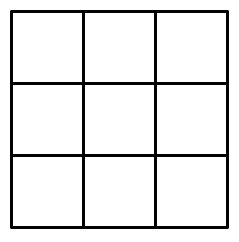0 All Around

I filled up a grid with numbers, such that if we pick any 2 (not necessarily consecutive) rows and columns, the sum of the 4 numbers in their intersection is equal to 0.
Which is the most specific/restrictive sentence that we say about the numbers in the grid?
This section requires Javascript.
You are seeing this because something didn't load right. We suggest you, (a) try
refreshing the page, (b) enabling javascript if it is disabled on your browser and,
finally, (c)
loading the
non-javascript version of this page
. We're sorry about the hassle.
Label the grid:
Fix two rows and consider the three equations in them:
We can add them together to obtain 2 ( a + d ) + 2 ( b + e ) + 2 ( c + f ) = 0 . Divide by two and subtract each of the original three equations separately to obtain a + d = 0 , b + e = 0 , c + f = 0 .
We can do the same for the other two pairs. We obtain a + g = 0 and d + g = 0 among the six equations produced. Now take this and a + d = 0 , and do the same thing as above: sum, divide by two, subtract each. We have a = 0 , d = 0 , g = 0 .
We can get the same with the others, giving all zeroes.
Thus we solved the system, obtaining the solution of all zeroes; this must be the answer.
Note: We have 9 linear equations in 9 variables. Since there is only one solution (all zeroes), this shows that none of the linear equations are redundant!